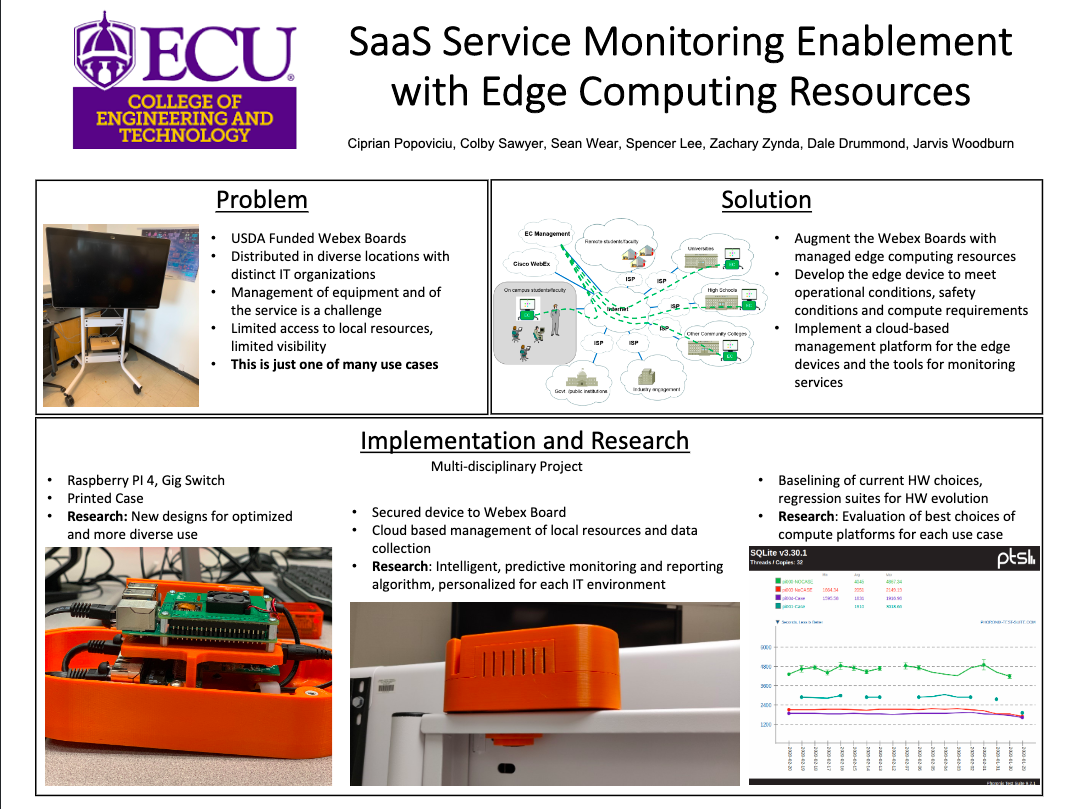
Spring Research Day
Presentation Poster from East Carolina University's Research day
-- Fall 2020 - Fall 2023 --
BRIDGES is a collaborative project between East Carolina University and George Mason University, funded by the National Science Foundation under the International Research and Education Network Connections program to deploy a cross Atlantic next generation research infrastructure. This 8000miles optical network ring with points of presence in Washington DC, New York, Amsterdam and Paris will be capable of delivering science data at a rate of 200 billion bits/second and will include support leading RENs (Research and Education Networks) in US (Internet2) and Europe (GEANT). BRIDGES will implement and expand upon the Generic Virtualization Architecture to demonstrate the ability to provide guaranteed resources to multiple simultaneous tenants of the infrastructure.

-- Summer 2020 - Current --
This is an applied research, multidisciplinary project developing a platform enabling easy deployment, management and operation of wireless sensors in support of education and research. Physical sensors are deployed in two campus locations and will provide data related to various education and research subjects. The primary goal is to make it easy for scientists and educators to deploy domain specific sensors, collect, manage and share the data. This is a collaboration including Technology Systems, Engineering, Geology, Biology and Coastal Studies. It is supported by College of Engineering, College of Science, Coastal Science Institute and ITCS.

-- Fall 2019 - Current --
We are developing an intelligent, agent based platform for monitoring multidomain IT services by using synthetic transactions. The synthetic transactions provide deterministic, controlled data to estimate the User Experience with specific services, to automatically detect anomalies and identify fault domains. The agents are deployed on embedded platforms that integrated with relevant network elements or service endpoints. A complete hardware solution for supporting the agents is developed at ECU with the participation of students from Information and Computer Engineering and from Industrial Engineering. The platform testing and development involves students from Information and Computer Engineering and from Computer Science.

-- July 2020--
A Multidisciplinary Project: Deploying Edge Computing to Augment Endpoint Functionality and Deploying a Network Management Overlay for Education Video Conferencing Services published.


-- Feburary 2020 --
Celebrates the many research efforts of faculty/students with the presentation of awards given for the top three posters and awards given for different categories to faculty and students

--February, 2020--
We all hear of virtual machines, virtual circuits, virtual local area networks, virtual memory, virtual routing and forwarding, virtual private networks and the list goes on. Technopedia.com lists 130 technical terms prefaced as “virtual” things. Individually these different concepts have shown to be useful in their own ways, within defined scopes. But what is the common thread connecting them all? In general, it is difficult to identify a clear common denominator other than the fact that they are simply software constructs of functionalities that used to require dedicated hardware.
Ciprian Popoviciu (East Carolina University), Jerry Sobieski (NORDUNet and George Mason University), Susanne Naegele-Jackson (Erlangen Regional Computing Center (RRZE)Friedrich-Alexander University), Bijan Jabbari (George Mason University)




A formal Generic Virtualization Architecture (GVA) offers a common generic object model for virtual resources, and a common set of life cycle primitives to manipulate those virtual resources. These aspects enable intelligent automated software agents to map the user’s concepts to appropriate, optimized, and efficient infrastructure components.
Ciprian Popoviciu (East Carolina Univ.), Dr. Bijan Jabbari (George Mason Univ.), Dr. Susanne Naegele-Jackson (Frederick Alexander University (Erlangen DE)), others.




Presentation Poster from East Carolina University's Research day

Dr. Popoviciu presenting our project slide at East Carolina Unversity's spring Research Day

The group stays to present during poster session

Harrison Thaxton takes first place at Palo Alto: Secure the Future competition